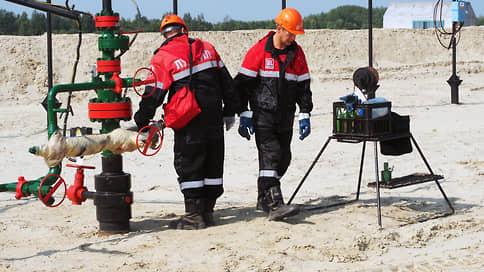It’s fun to download together – Newspaper Kommersant No. 167 (7368) of 09/12/2022
[ad_1]

Kommersant has learned that Gazprom Neft will expand its work with LUKOIL by creating a joint venture based on Evrotek-Yugra, which is developing the Karabashsky blocks in the Khanty-Mansi Autonomous Okrug. LUKOIL may receive a stake previously owned by the Spanish Repsol, which at the end of 2021 withdrew from assets in the Russian Federation. This is the second significant partnership between Gazprom Neft and LUKOIL — in 2021 they created a parity joint venture to develop the large Tazovskoye field in Yamal. According to experts, LUKOIL’s participation in Evrotek-Yugra will make it possible to start production faster.
Kommersant’s sources said that Gazprom Neft and LUKOIL could announce the latter’s entry into Evrotek-Ugra in the coming weeks. Gazprom Neft owns 100% in Evrotek-Yugra after it bought 50% from Spain’s Repsol late last year. As a result of the deal, LUKOIL may, in fact, receive a stake in the Spanish company.
Gazprom Neft and LUKOIL did not respond to Kommersant. Vadim Yakovlev, deputy head of the oil company, spoke at the end of August about the fact that in the “near future” Gazprom Neft could announce a “new partnership” on Evrotek-Yugra.
Evrotek-Yugra owns prospecting and appraisal licenses for the Sverdlovsky, Kileysky, Karabashsky-3 and Karabashsky-9 blocks, as well as two mining licenses – for Karabashsky-1 and Karabashsky-2, where the key asset of the project is located – the Ervie field (formerly Ourinskoye ; recoverable oil reserves – about 34 million tons). There is no production yet, but Gazprom Neft is already preparing for development.
As Kommersant wrote on December 20, 2021, Repsol completely sold its oil-producing assets in the Russian Federation as part of business optimization. The share in Evrotek-Yugra was its main project with Gazprom Neft, they have been engaged in joint development since 2017. Initially, Gazprom Neft bought only 25%, and then gradually increased its share.
According to Kommersant, Repsol was not entirely satisfied with the economy of the joint venture and sought to transfer the Evrotek-Yugra sites from the current tax system to an additional income tax (ATD). But the possibilities of using the scheme are limited, and Gazprom Neft chose to use the limit for assets that are wholly owned by it. Only after the consolidation of Evrotek-Yugra did Gazprom Neft include the Karabashsky-1 and 2 blocks in the AIT perimeter.
Under the EU and US sanctions, which led to the virtual withdrawal of Western majors from Russia, it is becoming more and more difficult for Russian oil companies to attract partners. Foreign companies not only acted as investors, but also provided the necessary technologies, taking into account the increase in the share of hard-to-recover oil reserves in production. Thus, the key partner of Gazprom Neft was the British Shell, which, after the outbreak of hostilities in Ukraine, announced its withdrawal from the Russian Federation and stepped aside from management in a joint venture with a Russian oil company. At the same time, LUKOIL, which has limited growth in its production portfolio in the Russian Federation and has significant financial resources, has more opportunities to expand partnerships with state-owned companies.
Gazprom Neft and LUKOIL created the first large parity joint venture at the end of last year on the basis of Meretoyakhaneftegaz, which is developing the Tazovskoye field in the Yamalo-Nenets Autonomous Okrug. LUKOIL paid Gazprom Neft 52 billion rubles for a 50% stake in the joint venture, including the assignment of half of the rights to claim on its loans for 35 billion rubles. LUKOIL pledged to invest about 9 billion rubles. in the exploration of the deposit. In addition, then the companies agreed to explore additional opportunities for cooperation. According to Kommersant’s interlocutors in the industry, a similar financial scheme can be used in the Evrotek-Yugra deal.
According to Advance Capital Managing Partner Karen Dashyan, Evrotek-Ugra requires significant investments in the exploration and production program. The expert believes that it is logical for both parties to structure the deal in such a way that LUKOIL’s entry would come at the expense of investments in the development of the project. With this in mind, the cost of acquiring a stake in itself may not be significant. The companies have a positive experience of joint management, which allows us to expect that in this project they will also be able to effectively develop the asset, sharing financial and geological risks, the expert believes. Independent expert Dmitry Kasatkin believes that the cost of 50% of Evrotek-Ugra could be about 5-10 billion rubles, noting that LUKOIL has the necessary technologies for developing complex structures similar to the Ervie field.
[ad_2]
Source link





